CRPG历史之12款带有创造性内容的RPG游戏
作者:Felipe Pepe
因为之前的文章取得了成功,所以作为CEPG Book Project的编辑我决定再次回来写下这篇文章。
这一次我也想要谈论一些随机选取的有趣/奇怪的计算机RPG,并且这也不是关于CRPG Book是关于什么内容的综合列表,。
让我们开始吧:
《Rings of Zilfin》(1987年)
1984年的时候,Roberta Willians凭借《国王密使》取得了巨大的突破,即从标准的文本冒险内容转向具有华丽色彩的图像,不仅呈现出了区域与谜题,同时也呈现出了四处走动并执行着各种行动的角色!这种效果在当时真的给人留下了深刻印象。
几年后,一个名为Ali Atabek的人认为《国王密使》真的太酷了。还有什么内容一样酷吗?那就是RPG游戏和街机游戏,如《太空入侵者》!于是《Rings of Zilfin》便诞生了。
在这个混合了冒险,RPG和街机游戏玩法的游戏中,你必须收集两个Rings of Zilfin并打败坏人。你将通过前往城镇而开始你的任务,然后与NPC交谈获取线索,并解决谜题,购买更厉害的装备,管理自己的耐力与体力级别。
游戏中的战斗非常有趣。玩家可以使用咒语,击剑,或按压攻击按键与地面上的敌人打斗。但是在面对天上的敌人时,玩家就需要采取《太空入侵者》般的游戏风格,如使用箭或咒语。而每个怪兽也都拥有不同的攻击模式。
不幸的是尽管作为一款有趣的游戏,它也需要玩家具有较高的耐性,即每次当你从一个区域移向另一个区域时,你都需要穿越一个移动场景,即你的角色将在与修道士交谈,收集蘑菇并与怪兽战斗的同时走向下一个场所。尽管这样的设定在一开始看来很酷,但如果它不断重复的话玩家很快便会感到无聊。
几年后《英雄传奇》系列出现了并成为冒险/RPG混合游戏的典型代表。而看着它们所采取的步骤真的很有趣,并且我们也想知道最终会出现什么不同的结果。让我们想象一款带有街机般射击内容且基于反应的RPG游戏会是怎样的。是不是觉得这个想法很愚蠢!
《Star Saga: One – Beyond the Boundary》(1988年)
现在有一些桌面游戏玩家依赖于手机或平板电脑应用去处理像掷骰子或角色表等内容。但大约30年前,Andrew Greenberg(即《Wizardry》系列的联合创造者)便已经在这款游戏中尝试了一些更有野心的内容。
从根本上来看这是一款复杂的多人太空CRPG,包含了贸易,探索等内容。但矛盾的是这其实是一款桌面RPG游戏,即计算机是Game Master。
玩家将购买这个昂贵但却吸引人的套装,并叫来自己的好友,选择角色,启动自己的IBM PC或苹果IIGS然后开始控制自己的生命。
尽管这是一个让人印象深刻的概念,特别是在当时,但是《Star Saga:One》其实很像一款电子CYOA(及观众选角扮演)游戏,如《Seventh Sense》。计算机将呈现给你当前可行的选择,而你将输入行动,然后机器会计算它并在附带的小册子中呈现出相关内容,在阅读这些内容的同时你还需要追踪自己的属性与库存:
精致的地图与多本小册子都让人对这款游戏留下了深刻的印象,但是在今天,我们已经很容易在手机上玩到这样的游戏,并且还带有动画地图且能够轻松呈现文本内容。但不管怎样在过去这还是一款很有趣且具有历史感的作品。
《The Magic Candle》(1989年)
还记得Ali Atabek以及他的《Rings of Zilfin》吗?他创建了Mindcraft并开发了《The Magic Candle》系列游戏,这也是80年代最独特的RPG之一。
尽管在游戏中你的任务是从恶魔手上拯救世界,但当游戏开始时这个所谓的恶魔就已经被打败并囚禁起来了。但囚禁恶魔的Magic Candle却不断融化着。一旦它完全融尽,恶魔便能够逃出来了。所以你的任务便是想办法阻止蜡烛融化。
时间管理是这款游戏的核心,即玩家只拥有几天的时间去完成任务(游戏邦注:这是由难度设置所决定)。为了有效利用时间,你可以合理分配群组,派遣每个角色去执行不同行动。你可以让魔术师去学习咒语,让战士去接受武器大师的培训,让精灵扮演裁缝的角色去挣钱,并让霍比特人去探索城镇且尝试着收集拯救蜡烛的线索。
比起与最终boss相抗衡或进行最后的地下城爬行任务,这款游戏是以一种不寻常的方式结束,你必须执行一个复杂的仪式才能恢复蜡烛,而在整款游戏中你都是根据传言,传说以及古老书籍上的记载去执行各种行动并收集各种材料。
尽管人们可能已经不记得着游戏了,但是《The Magic Candle》在很多年里仍然是标杆一般的存在,甚至在1996年被《Computer Gaming World》评选为具有最佳奖励性结局的游戏。
《Might & Magic III: Isles of Terra》(1991年)
对于《M&M III》有很多可以分享的内容,特别是关于这是一款在展示与易用性方面创造了巨大飞跃的优秀游戏。但相反的我想在此分享一个奇怪的故事。
在过去,游戏杂志统治着天下。而《Computer Gaming World》更是其中最大且最重要的杂志。其中有一位名为Scorpia的神秘女性便是这本杂志的RPG专家,她会在此评论游戏,编写论坛,回答电子邮件问题并分享一些提示内容。像她这样的人的分量与影响是今天游戏新闻业人士所不及的。
但是不幸的是Scorpia写了一篇有关《Might & Magic II》的苛刻的评论,她是这么写的:
“最初的游戏虽然不完美,但却充满想象且很有趣,并让我们觉得该系列的后续作品将充满前途。然而《Might & Magic II》似乎在无聊的‘怪兽打斗/Monty Haul’这条路上走偏了。”
New World Computing的成员似乎并不能接受这点,他们甚至为了出这口气而在《Might & Magic III》更加突出了这一敌人:
《Princess Maker 2》(1993年)
从理论上来看,《Princess Maker》更具争议性。这是一款关于将一个可爱的女生从10岁养到18岁的日本游戏,并引来了许多争议,而这也是这款游戏为何一直未能官方发行的原因之一。
然而从机制上来看,这却是一款非常出色的游戏。每个月你都会为你的女儿选择一系列活动,如参加魔法课程,体验伐木工人的工作或外出冒险。每种活动都会对这个女生的的游戏属性和能力产生不同的影响,并且可能引出一些特别事件,如在枪战决斗场战斗,遇见一个迷人的王子,与恶魔交谈,遭遇误入歧途的龙或对战神发起挑战。
当你的女儿外出冒险时,你可以基于典型的JRPG模式探索一些区域,并直接控制这个女生去搜索珍宝和事件,同时基于回合制模式与敌人战斗。
当你的女儿18岁生日时,游戏也就结束了,而她也将基于你所教授的一切继续生活。游戏有超过70种可能的结局,如她有可能变成将军,修女,舞者,农民,英雄,画家,作家,妓女,皇后,甚至是黑暗公主等等。
尽管这系列拥有多款游戏以及一些复制者,如《Long Live the Queen》和《Spirited Heart》,但却没有一款游戏真正与《Princess Maker 2》相近。
最后我想提一下,这是一款由Neon Genesis Evangelion旗下的工作室Gainax所开发的游戏。
《Superhero League of Hoboken》(1994年)
超级英雄CRPG是非常少见的。超级英雄已经在桌面RPG中出现了30多年,但是最早出现超级英雄的CRPG是1994年的《Superhero League of Hoboken》,这是一款RPG与冒险游戏的结合体。
同时这也是一款少见的幽默的CRPG游戏,一开始你将控制The Crimson Tape,这是一个只拥有创造组织图的技能的英雄。
只要使用他那惊人的领导能力,你便能够获得一群看似并不强大的英雄,如能够提升敌人胆固醇的Tropical Oil Man,能够轻轻松松地吃辣的Iron Tummy以及能够不打开披萨盒子便看到里面的东西的Mademoiselle Pepperoni。
但是所有这些看似无用的的能力都能够用于战斗中去解决谜题(如吃下大量墨西哥辣椒)或作为一种实用技能(一些披萨盒中可能具有陷阱)。此外还有一些真正无用的英雄,但他们也能够通过各种途径获取全新能力,如吃下具有反射性的快餐。
基于简单的《Wizardry》般的回合制战斗以及9个群组成员并呈现出一系列常见的冒险游戏元素的《Superhero League of Hoboken》有时候也会让玩家太过受挫,但其古怪的幽默感以及不可预测的情节发展却足以吸引玩家去尝试看看。
《Omikron: The Nomad Soul》(1999年)
关于David Cage的游戏的一种常见的批评是它们缺少游戏玩法,让人感觉更像是带有快节奏实践的互动电影。奇怪的是,他的第一款游戏却并非如此—-《Omikron》几乎结合了每一种电子游戏类型。
游戏的一开始一个警官摧毁了第四面墙并会让你占有自己的身体,带领你进入虚拟的Omikron世界并帮助他抓捕凶手。然后你便会像面对冒险游戏那样开始游戏—-寻找线索,与角色交谈,解决像“通过添加安眠药到警察局长的咖啡里而通过安全检查”等谜题。
然后你需要前往超市阻止一宗打劫案,这时候游戏将变成一款FPS。即你将射击强盗,收集子弹和生命值等等。当你将劫匪的头领逼入绝境时,你将与其展开决斗,这就像是《街头霸王》一样。
如果你因为角色太弱了而艰难前进,你便可以选择去训练角色并提升他的游戏属性,这是RPG游戏风格。还不够吗?你还可以离开警官的身体并选择其他角色,如年轻的记者,护士,文学学科学生,妓女或雇佣兵—-所有的这些角色都拥有不同的属性和道具。但显然,所有的这些角色都不能在警察局周围自由行动,所以你需要找到一种替代方法去解决谜题。
这是一款具有满满野心的游戏,特别是在当时。
我还未提及1999年出现的《Omikron》(游戏邦注:即在《Shenmue》诞生前一个月以及《侠盗猎车手III》诞生前两年)已经呈现出了一个巨大的3D城市,并带有许多玩家能够自由探索的不同区域—-玩家能够访问商店,购买东西,听取留言,执行任务,驾驶汽车并寻找更多可占有的角色。
最终,游戏突显了David Bowie这个角色。这并不只是一个小配角,他是游戏中的主角并且创造了部分游戏音频,并且这些音频还收录到了Bowie的唱片中。此外,他还扮演了一支具有变革性的摇滚乐队中的歌手。当你在探索游戏中的巨大城市时,你便能够听到他所演唱的歌曲:
不过遗憾的是,《Omikron》显得有点混乱。看起来较为笨拙,前后矛盾且让人感到困惑。但这也是史上最有趣,最具创新性的混乱内容。不过也是一款在商业上遭遇了失败的游戏,并最终导致David Cage转向创造“较为保守”的游戏。
《Gorky 17》(1999年)
尽管有时候我们好像已经看过了所有可能性,但是关于两种游戏类型的简单结合却仍会带给我们一些新鲜感。例如死亡金属与Jpop的结合。或者基于回合制的《生化危机》。
而《Gorky 17》便是结合了预先渲染的背景,突变的怪兽,较为简单的谜题解决机制,带有回合制和群组的RPG战斗的游戏的恐怖对话的游戏。(说实话,比起《生化危机》,我觉得它更像是《寄生前夜》。)
《Gorky 17》甚至拥有引进每次boss战斗的超酷(在当时看来)CG视频:
尽管这并不能称为一款经典游戏,但《Gorky 17》却是一款很有趣的游戏,它向我们展示了创造性是如何创造出让人感到新鲜的游戏体验。
《Arcanum: Of Steamworks and Magick Obscura》(2001年)
如果说Troika的《Arcanum》是一款不是爱上就是恨上的游戏便是一种保守的说法。
如果你着眼于RPG Codex的最佳RPG列表,你便会发现这款游戏骄傲地待在第5名的位置上,超过了像《Morrowind》和《VtM:Bloodlines》等游戏。但是在Rock Paper Shotgun的前50名RPG列表以及IGN或NeoGAF的前100名RPG列表中我们却找不到这款游戏。
而现在在《Arcanum》中还有许多我们并不喜欢的内容。这是一款充满漏洞且并未完成的游戏,虽然突出了回合制与实时战斗,但却都让人觉得很无聊。更别提它还拥有一些RPG历史上最糟糕的地下城。
然而当你去考虑游戏的深度,反应性与复杂性时(从精心制作的角色系统到具有创造性的设定:被产业变革所破坏的奇幻世界)时,所有的这些缺陷也就变得无关痛痒了。
尽管游戏背景中有一个“拯救世界”的任务,但是游戏中的大多数冲突都是基于种族,文化和财富等问题。你将面对像工厂里的半兽人雇员(而不只是龙和邪恶的巫师)的工作条件的争论等情况。而关于玩家如果基于不同角色去体验紧张的游戏世界则让人印象深刻。
举个例子来说吧,魔法与技术间的冲突意味着你的巫师可能会因为魔法冲突的风险而不能坐火车旅行,同时你的发明家还将强调像咒语等强大魔法(不管好坏)不再能够对自己产生任何影响。
但这里还存在一些社交/种族元素,如没有声音的半食人魔将变成一种低等生物,而华丽的女精灵将受到所有人的欢迎(除了矮人族),但同时她们也还要面对一些性爱玩笑。让我们看看下图:
作为一个拥有生动的世界且玩家能够基于不同方式作出选择的游戏,反应性是《Arcanum》的关键。从简单的细节,如你的团队成员如何在你拯救了他们后感谢你,到每日报纸如何报道游戏世界中所发生的事件,并且会呈现说明,支线任务暗示甚至是有关你的最新壮举的头条内容:
除了充满有趣的任务的有趣的世界外,《Aranum》同时也会提供能够匹配游戏设定的有趣的解决方法。是否需要去解决一次凶杀案?为什么?如果你是一名巫师,你便可以找回牺牲者的灵魂并问他谁是凶手:
这些时刻便是《Arcanum》的角色扮演的最高峰。它们具有其它游戏难以匹敌的深度,并能够让玩家看到一款CRPG所具有的深度与反应性。
遗憾的是,最终证明Troika很难保持这个充满野心的世界的运转。游戏非常不平衡,并且难以保持一致。你会因为能够与被谋杀的女孩的灵魂交谈或复活一个已死的强盗而对游戏充满敬畏,但当你发现同样的咒语不能用于其他角色或其它情境中时你便会更加失望。
《Freedom Force》(2002年)
这是来自Irrational Games的第二款游戏,即在他们与Looking glass Studios合作发行了《System Shock 2》之后,而《Freedom Force》也是一款超级英雄RPG。
《Freedom Fore》是基于2D战斗和特别的谜题解决机制的冒险/RPG游戏结合体,同时也是对于漫画的白银时代(游戏邦注:指美国主流漫画界取得巨大艺术进步和商业成功的一段时期,尤其是在超级英雄方面)的致敬—-不管是冷战背景还是艺术风格以及劣质英雄朝着更劣质的恶棍开枪。
这同时也以一种史无前例的方式去实践超级英雄行动,即让玩家能够飞跃城市,在屋顶上跳跃,并且如果玩家足够强壮的话还能朝着敌人扔汽车。
此外,这款游戏还突显了一组精心设计的工具让玩家能够创造属于自己的英雄,并设置其属性,能量与能力。而所有的这一切都是基于强大的定制程度:
出现于游戏中的模组社区也很强大,并为游戏添加了无数全新能量,效果和英雄。所以如果你不喜欢Ken Levine的超级英雄,你也可以创造属于自己的团队去实现粉丝梦,兴许你还可以将绿灯侠,Spawn,蜘蛛侠与《鬼玩人》的Ash组合在一起呢!
我便是这么做的。下图便是他们联合在一起对抗蝙蝠侠:
显然他们失败了。
让人难过的是,游戏世界有时候也会转回自己的英雄,同时,虽然在当时《Freedom Force》卖得不错,但是其2005年续集《Freedom Force vs. The Third Reich》却只卖出了4万份,并因此导致Irrational Games放弃制作第三部游戏的打算。
《7.62 High Calibre》(2007年)和《Marauder》(2009年)
回合制和实时机制,哪个才是最佳战斗模式?我相信不管怎样回合制总是最适合游戏!但Aperion的《7.62 High Calibre》却是一个强大的反例。
受到《铁血联盟》游戏的启发并且作为《Brigade E5》的后续作品,这款俄罗斯游戏使用了基于暂停的实时系统设计。并体现出了强大的现实性。
在游戏的功能中(让你能够瞄准特定的身体部位)拥有七种移动速度,四种射击速度(鲁莽射击,快速射击,有效射击以及精确射击),四种射击模式(你可以设置自己将发射多少枚子弹),第一人称摄像机将呈现给你角色的视觉效果以及肾上腺素仪表,让角色能够更快速地做出反应,但是如果他们感到紧张的话精确度也会大大降低。
但是真正的核心其实是其基于暂停的实时系统,即每个行动都将占据一定的时间—-甚至会精确到厘秒!游戏将确保你知道这些厘秒,并能够朝着伏兵快速射击或较慢地朝着目标进行射击,而这也意味着第一次射击与永不射击之间的区别。
这表现出了模拟的程度,甚至连你的口袋管理也很重要—-即伸手去拿你的背心口袋里的架子比拿背包里的架子快多了,而这其中的时间差也将决定着你的生死。
不仅如此,游戏还拥有最综合的枪支描述,即伴随着几百支枪,大量配件(游戏邦注:手电筒,激光,榴弹发射器,消声器等等),各种类型的弹药和弹药库,以及霸占一些管带并组合两个弹药库以在重新加载的时候节约几秒钟时间。
如果你需要的话,像Silver Girls’s Armory等模组包还能够添加一些额外的枪支:
我是看着《纽约大逃亡》长大的,所以我认为添加范围到左轮手枪中是基本要求。
枪支不只是DPS处理器。它们拥有各种属性并决定着各自的存亡,包括持久性以及它需要花费多少厘秒做准备并发射。例如长步枪需要花费比光手枪多5倍的时间,而如果你不知道这一点的话便会很吃亏。
现在,如果要列举一款像这样巨大的沙盒般游戏的话,你便可以着眼于Aperion之后的游戏《Marauder》(亦称《Men of Prey》)。基于一系列俄罗斯小说,这款游戏使用了统一的引擎和系统并将玩家置于Akhmetzyanov的鞋子中—-他是一个在祖国被美国人入侵的历史中尝试着与妻子一起努力活下来的俄罗斯男人。
尽管《7.62’s》的系统是流线型的,并伴随着较少的武器,行动和资源,但它仍然是一款具有挑战性的策略型RPG,让玩家能够计算每一颗子弹与每一秒的时间,并且在激烈且具有奖励性的战斗中还能测试自己应对不可能的胜算的能力。
我必须补充的是,在基于回合制的战斗中,战斗其实是不可能的,或者当轮到你的时候你将只是与20个人静静地站着进行射击练习。
(本文为游戏邦/gamerboom.com编译,拒绝任何不保留版权的转发,如需转载请联系:游戏邦)
CRPG History Abridged II – 12 more RPGs that brought something new to the table
by Felipe Pepe
Surprisingly (or maybe not), the previous click-baity article was a success and very well received, so I, your maybe-friendly editor of the CRPG Book Project, came back to make another one.
Now, if that wasn’t clear last time, I’m intentionally leaving out games like Diablo, Fallout, Baldur’s Gate, Mass Effect and other extremely popular titles that everyone know about in order to focus on the obscure and amusing games, mechanics or even curiosities.
This once again is just a random sampling of cool/weird computer RPGs I wanted to talk about, in no way intended to be a comprehensive listing – that’s what the CRPG Book is for – this is just for those too lazy lazy lazy busy to read the entire thing. Shame on you.
Anyway, here we go:
Rings of Zilfin (1987)
In 1984, Roberta Willians made a breakthrough with King’s Quest, moving from the then-standard text-adventures to glorious colored graphics, that would not only illustrate areas and puzzles, but also display an animated character, walking around and doing stuff! Yes, this was mind blowing back then.
A few years later, a man named Ali Atabek thought King’s Quest was really cool. But you know what’s also cool? RPGs! And arcade games, like Space Invaders! And thus Rings of Zilfin was born.
A weird mixture of Adventure, RPGs and Arcade gameplay, you must collect the two Rings of Zilfin and defeat the evil bad guy. You begin your quest by traveling to towns, talking to NPCs for clues, solving puzzles, buying better equipment and managing your endurance and fatigue levels.
Combat is quite interesting. Ground foes are fought with spells, swords of even point-blank shots with your bow, just by pressing the attack button. But flying enemies must be shot down Space Invaders-style either with arrows or spells. And each monster has a different attack pattern.
Unfortunately, while a amusing game, it requires extreme levels of patience, as every time you move from one area to another you must go through the traveling scene, which has your character walking to the next location while talking with monks, collecting mushrooms and battling monsters. While these look cool at first, enduring it every single time gets repetitive and boring really, really fast.
A few years later the Quest for Glory series would emerge and become the poster child for Adventure/RPG hybrids. But it’s interesting to see the steps taken along the way, and wonder how different things could have turned out… Just imagine, reflex-based RPGs with arcade-like shooting sections… Heh, what a silly idea.
Star Saga: One – Beyond the Boundary (1988)
Some tabletop players nowadays rely on phone or tablet apps to handle things like dice rolls or character sheets. But, almost 30 years ago, Andrew Greenberg (a.k.a. Werdna, evil wizard and fabled co-creator of the Wizardry series) tried something a bit more ambitious with this game.
Basically, it’s a complex multiplayer space CRPG, full of trading, exploration, and such. The twist is that, like a geek’s wet dream, it’s actually a tabletop RPG, where the computer is the Game Master.
You would purchase this expensive and totally awesome boxset, gather your friends, choose a character, boot up your IBM PC or Apple IIgs machine and have the time of your life.
While impressive in concept, especially at the time, in practice Star Saga: One is very similar to an electronic CYOA game (like Seventh Sense). The computer shows your currently available options, you input your actions, the machine calculates it and displays which passage in the accompanying booklets you should read, while also keeping track of your stats and inventory:
The elaborate map and the multiple booklets give it an impressive and intimidating look, but in truth today a game like this could be easily played on a cellphone, with animated maps and convenient displaying of the text passages. Still, it’s an interesting historical artifact, way ahead of its time.
For a more detailed examination of this oddity, try the CRPG Addict’s blog entry on it.
The Magic Candle (1989)
Remember Ali Atabek and his Rings of Zilfin? I hope so, or you have short-term memory loss (or didn’t read what I wrote up there). Well, he went on to found Mindcraft and develop The Magic Candle series, one of the most unique RPGs of the 80′s.
Although your quest is to save the world from an evil demon, said demon is already defeated & imprisoned when the game starts. But he’s imprisoned inside the eponymous Magic Candle, which is melting. Once it burns out, the demon will escape, so your quest is actually to find a way to stop the candle from melting entirely.
Time-management is the core of Magic Candle, as you have a limited number of days to complete your quest (determined by the difficulty setting). To make the most of your time, you can split your party, sending each character to perform a different action. You can send the mage to learn spells, the warrior to train with a weapon master and the elf to work as a tailor to earn money while you take the hobbit to explore the town and try to gather clues on how to save the candle.
All this culminates in an extremely unusual ending where, instead of fighting an end boss or enduring a final dungeon crawl, you must perform an elaborate ritual to restore the candle, one you spent the entire game putting together and collecting ingredients for, based only on rumors, legends and old books (and taking notes on paper, of course – the game won’t record any of this).
While almost entirely forgotten today, the The Magic Candle left a mark for many years, being chosen “the most rewarding game ending ever” by Computer Gaming World in 1996.
Might & Magic III: Isles of Terra (1991)
A lot could be said about M&M III, especially about how its a great game that performed a huge leap in presentation and accessibility. But I’ll just share a weird story instead.
Back in the day, gaming magazines ruled the land. Computer Gaming World was arguably the biggest & most important of all. High in its towers, a mysterious woman called Scorpia was its resident RPG specialist, reviewing games, writing columns, answering mailed questions and sharing hints. The weight and influence people like her held are unlike anything in modern gaming journalism.
So it was unfortunate for New World Computing that Scorpia wrote a very harsh review for Might & Magic II, in which she said:
“The original game, while not perfect, was imaginative and interesting, and showed great promise for future entries in the series. However, Might & Magic II seems to have swerved off the path in the boring ‘monster mash/Monty Haul’ direction” [...] – Scorpia – CGW #57, March 1989
The folks at New World Computing didn’t take this very well, and in revenge the third Might & Magic game featured this enemy:
I swear I didn’t make this up.
Princess Maker 2 (1993)
Thematically, Princess Maker is rather controversial. A Japanese game about raising a cute girl from her 10 to 18 years sets off a lot of alarms, which is part of the reason why it was never officially released here (there’s only a leaked beta translation).
Mechanically, however, it’s brilliant and unrivaled. Each month you pick a series of activities for your daughter to perform, like taking Magic classes, working as a lumberjack or going out on adventures. Each activity has a different impact on her countless stats and abilities, and might lead to special events, like fighting in a gladiator arena, meeting a charming prince, chatting with demons, encountering a perverted dragon or even challenging the God of War for a fight – I’m serious.
When going out on adventures, you can explore a few set areas in a typical JRPG format, directly controlling the girl in search of treasure and events, while fighting enemies in turn-based mode.
At her 18th birthday the game ends, and she’ll go on to live a life or her own, based on how you raised her. There are over 70 possible endings, where she can become things like a General, Nun, Dancer, Farmer, Hero, Painter, Writer, Prostitute, Queen or even the Princess of Darkness.
While the series has many games and a few copy-cats, like Long Live the Queen and Spirited Heart, there’s nothing that comes close to Princess Maker 2.
As a side note, the game was developed by Gainax, the studio behind Neon Genesis Evangelion.
Superhero League of Hoboken (1994)
Super-Hero CRPGs are a rare breed. They have been in tabletop RPG for over 30 years, all we had in CRPGs was 1994′s Superhero League of Hoboken, a RPG/Adventure hybrid.
And what an exotic beast this is! Hoboken is also one of the very rare humorous CRPGs, so you begin by taking control of The Crimson Tape, a hero who’s only skill is to create organizational charts.
Using his amazing leadership you’ll recruit a bunch of similarly-not-powerful heroes, like Tropical Oil Man, who can raise the cholesterol levels of enemies, Iron Tummy, who can eat spicy food without feeling sick and Mademoiselle Pepperoni, who can see what’s inside a pizza box without opening it.
All these seemingly-useless powers are either used in combat (make enemies have a heart attack), to solve puzzles (eat a massive amount of jalapenos) or as general utility skill (some pizza boxes may contain traps inside). Others heroes are really just plain useless, but can acquire new powers by various means, like eating radioactive fast-food.
Presenting a mix of Legend’s usual adventure games (like Deathgate and Spellcasting 101) with a simple Wizardry-like turn-based combat with NINE party members (!), Superhero League of Hoboken can sometimes be a bit grindy and frustrating, but the weird humor (especially the game’s enemies and their attacks) and the unexpected plot twists are more than enough to give this game a try.
Omikron: The Nomad Soul (1999)
A common criticism of David Cage’s games is that they lack gameplay, feeling more like interactive movies with quick-time events. Oddly enough, his first title is the exact opposite of that – Omikron has almost every single video game genre mixed together.
The game opens with a police officer breaking the fourth wall and asking you, the player, to possess his body, enter the virtual world of Omikron and help him solve a murder. You’ll then start playing it like an adventure game – looking for clues, talking with characters and solving puzzles like “get past security by adding sleep pills to the police chief’s coffee”.
Then you get called to stop a robbery at a supermarket, and the game suddenly becomes a FPS. Shoot the robbers, collect ammo & health kits, etc. And just when you’ve cornered the leader of the gang, he disarms you and you must defeat him mano-a-mano, Street Fighter-style.
If you’re having a hard time because your character is too weak, you can always train him to increase his stats, RPG-style. Still not enough? Well, just leave the police officer’s body behind and possess other characters, like a young journalist, a nurse, a literature student, a hooker or a mercenary cyborg – each with different stats and items. But obviously, none of those will be able to walk freely around the police station, and so you’ll have to find an alternative way to solve puzzles there…
It’s simply mind-bloggling how ambitious this game is, especially for the time.
And I didn’t even mentioned that Omikron came out in 1999 – a month before Shenmue and two years before GTA III – yet it already featured a large 3D city with multiple districts that you can freely explore – visiting stores, purchasing stuff, listening to rumors, taking quests, driving your car around and finding more people to possess.
Finally, the game features David Bowie. And not just a small cameo – he’s a major character in the game and composed part of the game’s excellent soundtrack, later rearranged into Bowie’s “Hours…” album. More even, he also plays a second role as singer in an outlawed revolutionary rock band. As you explore the giant city, you might find where’s performing and watch him sing a few songs:
Sadly, Omikron is a mess. Clunky, inconsistent and confusing. But it’s one of the most interesting, bizarre and innovative messes ever made. It’s a shame that it was a commercial failure and resulted in David Cage moving towards “less gamey” games…
Gorky 17 (1999)
While sometimes it may feel like we’ve seen everything already, a simple and unexpected mix of two genres can offer something fresh. Like Death Metal + Jpop. Or a turn-based Resident Evil.
Gorky 17 (a.k.a. Odium) is the result of the later, mixing the pre-rendered backgrounds, mutated monsters, light puzzle-solving and horrible dialogs of the first RE games with turn- and party-based RPG combat. (To be honest, it reminds me more of the Parasite Eve games than Resident Evil, but referencing those doesn’t have the same appeal).
Gorky 17 even has those cool (for the time) CG videos that introduce each boss battle:
While it’s far from being a classic game, Gorky 17 is a fun game, that shows how just a bit of creativity (or creative borrowing) can create fresh experiences.
Arcanum: Of Steamworks and Magick Obscura (2001)
Saying that Troika’s Arcanum is a love-it-or-hate-it game is an understatement.
If you look at the RPG Codex’s Top RPG List, you’ll find it proudly sitting at #5, above games like Morrowind and VtM: Bloodlines. But you won’t find it anywhere on Rock Paper Shotgun’s Top 50 RPG list, or even listed among IGN’s or NeoGAF’s Top 100 RPGs.
Now, there’s a lot to dislike in Arcanum. It’s an inconsistent, buggy and barely finished game, that features both turn-based and real-time combat, yet both feel clunky and boring. Not to mention the fact that it has some of the worst dungeons in RPG history.
However, all that becomes irrelevant (or at least tolerable) when you factor in the insane amount of depth, reactivity and complexity the game offers, from its elaborate character system to its well-crafted and original setting: a magical fantasy world torn by an industrial revolution.
While there’s a “save the world” quest in the background, most of the conflicts in the game are based on issues of race, culture and wealth. You’ll face situations like the controversy over the working conditions of orc emplyees on factories, not just dragons and evil wizards. And it’s really impressive how you can experience the tensions of the world by playing the game with different characters.
For example, the Magic vs. Technology conflict means that your wizard likely won’t be allowed to travel via trains due to risk of magical interference, while your inventor embodies such a powerful denial of magic that spells – both harmful and friendly – might stop having any effect on him.
But there’s also the social/racial aspect, like how the dumb half-ogre will be hostilized as an inferior creature everywhere, while the beautiful female elf (there’s a Beauty stat) will be well-recieved by all (except dwarves), but be often patronized and have to deal with sex jokes. Here’s an example:
Reactivity is the key of Arcanum, as the whole world feels alive and acknowledge your choices in different ways. From simple details, like how your party members actually thank you when you resurrect them after combat, to how there’s a daily newspaper that reports events going on in the world, providing exposition, subtle side-quest hints and even headlines on your latest feats:
Beyond an interesting world filled with interesting quests, Arcanum also offers interesting solutions and approaches, all fitting the setting. Have to solve a murder? Why, if you’re a necromancer, just call back the victim’s ghost and ask her who killed her:
These moments are the pinnacle of Arcanum’s role-playing. They deliver a depth that few other games can rival, and offer a glimpse into just how complex and reactive a CRPG can truly be.
Sadly, it proved an impossible task for Troika to keep this extremely ambitious world turning. The game is very uneven and fails to keep consistency. You’ll be in awe that you can talk to the soul of a murdered girl or resurrect a dead bandit you found in a cave, but that will make you all the more disappointed when the same spells won’t work on other characters and situations.
Going on a musical tangent, Arcanum is a bit like the Tales from Topographic Oceans of RPGs: either you see it as a grandiose, ambitious show of skill that encapsulates some of the finest playing of its time, or as a dense and bloated masturbatory exercise, a late curtain call for its kind.
I’m both a Yes and Troika fan, so you know where I stand.
Freedom Force (2002)
The second title from Irrational Games, right after joining forces with Looking Glass Studios to deliver System Shock 2 (:fanboy squeal:), Freedom Force is again a Super-Hero RPG – the only one since Super Hero League of Hoboken, almost a decade earlier.
But while that was a adventure/RPG hybrid, based on 2D battles and weird puzzle solving, Freedom Force is a full homage to the Silver Age comics, from the cold war setting and the art-style to the cheesy heroes shooting one-liners at even more cheesier villains.
It also captures super-hero action in an unprecedented way, allowing you to fly over the city, jump from rooftop to rooftop and, if you’re strong enough, even throw cars at enemies.
Furthermore, it feature an elaborate set of tools to create your own heroes, allowing you to set its stats, powers and abilities, from just having a strong punch to flying, being made of ice and firing mind-controlling energy beans. All with a huge degree of customization:
The modding community that emerged from the game was also huge, adding hundreds of new powers, effects and heroes to the game. So if you dislike Ken Levine’s ragtag band of superheroes, just fulfill your fan-fiction dreams and create your own team, maybe with Green Lantern, Spawn, Spider-Man and Ash from Evil Dead!
I did. Here’s them fighting Batman:
They lost, obviously.
Sadly, the world sometimes turn its back to its heroes, and while Freedom Force sold reasonably well at the time, its 2005 sequel, Freedom Force vs. The Third Reich sold only about 40.000 copies, forcing Irrational Games to abandon the plans for a third game.
7.62 High Calibre (2007) & Marauder (2009)
Turn-based or real-time, which is the best combat mode? That’s one of the biggest wars in the RPG fandon (and among developers). I believe in whatever fits the game best TURN-BASED ALWAYS!!!11, but Aperion’s 7.62 High Calibre is a strong counter-argument.
Heavily inspired by the Jagged Alliance games and sequel to Brigade E5, this Russian game employs a real-time-with-pause system designed for realism. Like, MAXIMUM realism.
Among its features, the game allows you to aim at specific body parts, has seven movement speeds, four shooting speeds (from the hip, quick aim, good aim, precision shot), four shooting modes (you can even set how many bullets you’ll fire in a burst), a first-person camera that shows you the exact vision of a character and even a adrenaline meter that makes a character act faster but with less accuracy the more nervous he is.
But the real core of the game is its real-time-with-pause system, where each action takes a certain amount of time – tracked down to centiseconds! And the game will make sure that you are aware of those centiseconds, as reacting to an ambush with a quick shot from the hip or with a slower aimed shot can mean the difference between firing the first shot or never firing at all.
It presents such a degree of simulation that even your pocket arrangement matters – reaching for a clip in your vest pocket is faster than reaching for the one in your backpack, and those seconds can sometimes mean the difference between life and death.
But it doesn’t stop there. The game engages in the most comprehensive gun porn ever made by man, with hundreds of guns, loads of accessories (scopes, flashlights, lasers, under barrel grenade launchers, silencers, nigh vision, etc), multiple ammo and magazine types types and even the option to grab some duct tape and tape together two magazines to gain a few seconds when reloading.
And if you need even more, modpacks like Silver Girl’s Armory add a few extra bazilion guns:
I grew up with Escape From New York, so adding scopes to revolvers is a basic need.
And the guns aren’t just DPS-dealers. Each has various stats that are key to your survival, from durability and range to how many centiseconds it takes to ready & fire it. For example, a long rifle can take five times the time to ready than a light pistol, a deadly disadvantage if you’re caught unaware.
Now, If a huge sandbox-like game like this feels a bit overwhelming, you can take a look at Aperion’s following game, Marauder (a.k.a. Men of Prey). Based on a series of Russian novels, it uses the same engine & systems and place you in the shoes of Akhmetzyanov, a no-bullshit Russian man trying to survive with his wife in an alternate history where the Motherland was invaded by filthy Americans.
While 7.62′s system is here heavily streamlined, with way less weapons, actions and resources, it’s still a challenging tactical RPG that will make you count every single bullet and second, in intense and rewarding battles where you’ll test your wits against impossible odds.
Battles which, I must add, wouldn’t be possible in turn-based combat, or you would be standing still with 20 guys playing target practice with you every turn.
——-
That wraps it for today. Thanks for reading and, once again, if you enjoyed this list there’s a 200-page preview of the upcoming CRPG Book right here for download, filled with this kind of content! And it’s still free! ![]() (source:Gamasutra)
(source:Gamasutra)
上一篇:关于游戏动画师一天的工作生活

























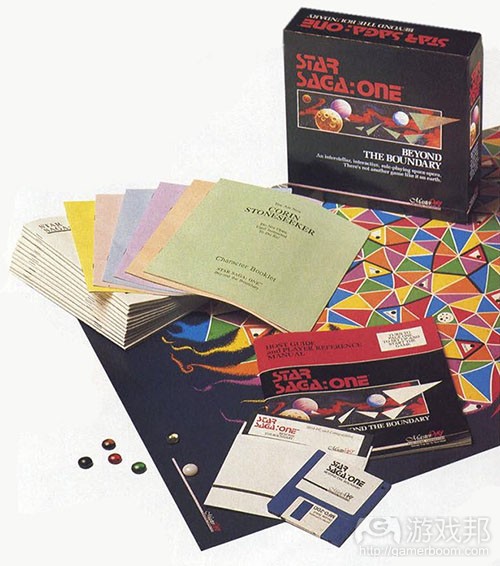
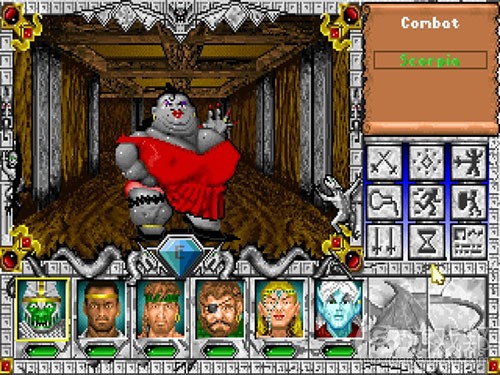
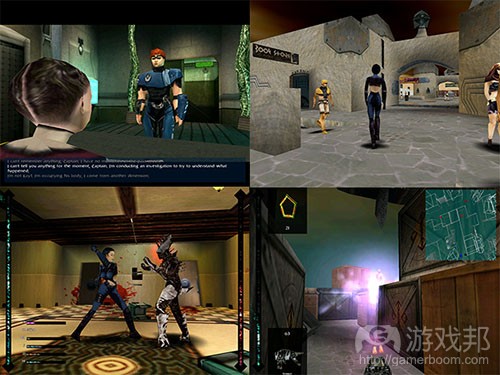
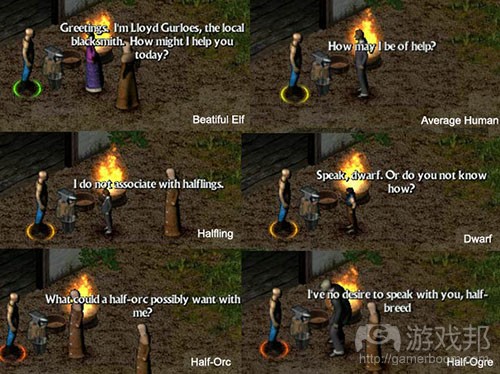
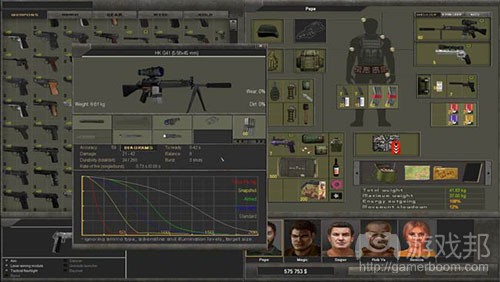














 闽公网安备35020302001549号
闽公网安备35020302001549号